By: Ray Day
CONTACT:
We wanted to share our latest consumer and business insights, based on research from Stagwell. Among the highlights of our weekly consumer sentiment tracking:
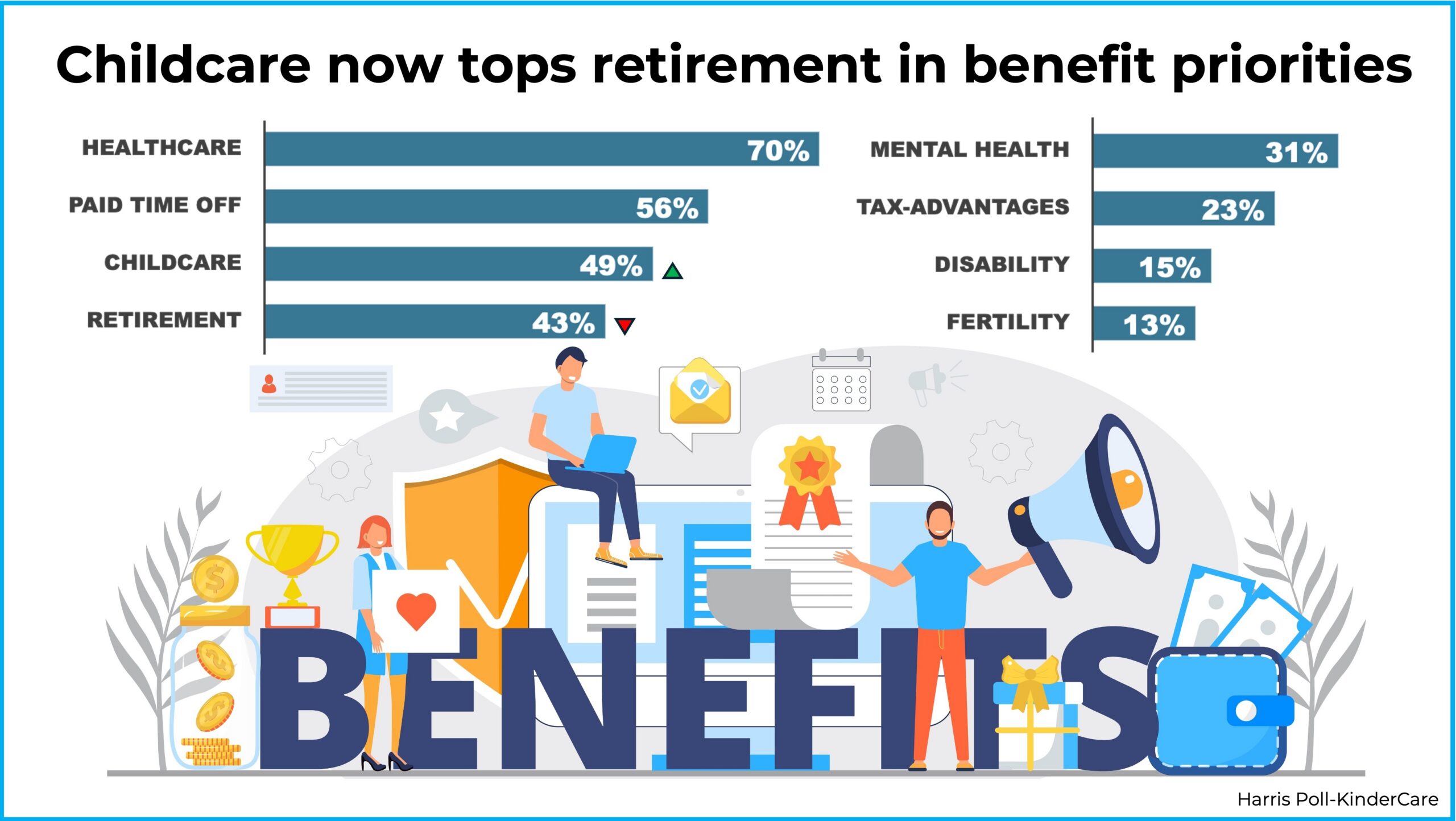
CHILDCARE MORE IMPORTANT THAN RETIREMENT
Childcare has overtaken retirement benefits in the workplace, and most employees believe their employer is falling behind, based on new Harris Poll research with KinderCare.
- 85% of all working parents say childcare benefits should be treated as essential – on par with health and retirement benefits.
- 79% of working parents would be more loyal to their company if their employer supported them better as a parent.
- 1 in 3 employers offers no child care benefits today.
- Parents report missing work (50%), reducing work hours (35%), and experiencing tension with managers (28%) and coworkers (24%) due to a lack of reliable child care.
EMPLOYEES = BEST STORYTELLERS
Consumers trust employees more than any other company communications for storytelling, according to our Harris Poll research.
- 74% say employees are more influential than marketing in shaping a company’s brand.
- 78% say posts from employees are more authentic than posts from official corporate accounts.
- 49% say posts from non-executives feel authentic, compared with 12% of posts from executives.
- Adults are more likely to apply (74%) and support (70%) a company after seeing employee experiences.
- Yet 64% of employees say they’ve rarely or never posted about their current employer, job or industry.
- 36% are not confident they can share honest opinions about their company online without fear of retaliation.
PETS OVER CHILDREN?
The perception that Gen Z and Millennials see pets are less of a financial burden than children is outdated, according to our Harris Poll research with Empower research.
- 42% of Gen Z and Millennials say they prefer pets to children because they view them as less financially burdensome.
- Yet, since 2020, pet care costs have increased more than childcare costs (34.6% higher for pets versus 25.8% higher for children).
- 43% of dog owners are concerned about rising costs of pet care.
- 60% of Gen Z and Millennial pet owners prioritize spending on their pets over themselves.
- 35% of Americans say their pets motivate them to work harder and seek higher pay.
UNSANCTIONED AI
Chief innovation officers are facing the consequences of an AI governance gap, according to our Harris Poll research with Dataitku.
- 89% of CIOs say unfettered AI access will create significant technical debt within organizations.
- 82% say they are creating AI apps and agents faster than IT can govern them.
- Only 25% have full visibility into all agents in production.
ICYMI: In case you missed it, check out the thought-leadership and happenings around Stagwell making news:
- Astrology Is The New Career Counselor (Harris Poll)
- Ask these 6 money questions on a first date (Harris Poll)
- Is ‘Design’ Creative? (Instrument)
- Guide to Ramadan 2026 (Assembly)
- The Numbers are Clear: Latest Iteration of Stagwell’s News Advertising Study Shows Germans Love Their News (Stagwell’s Future of News)
Newsletter
Sign Up
Related
Articles
Weekly Data
Feb 19, 2026
WHAT THE DATA SAY: 79% would be more loyal if employers better supported parents
Childcare has overtaken retirement benefits in the workplace, and most…
In the News, Press Releases
Feb 18, 2026
The Numbers are Clear: Latest Iteration of Stagwell’s News Advertising Study Shows Germans Love Their News
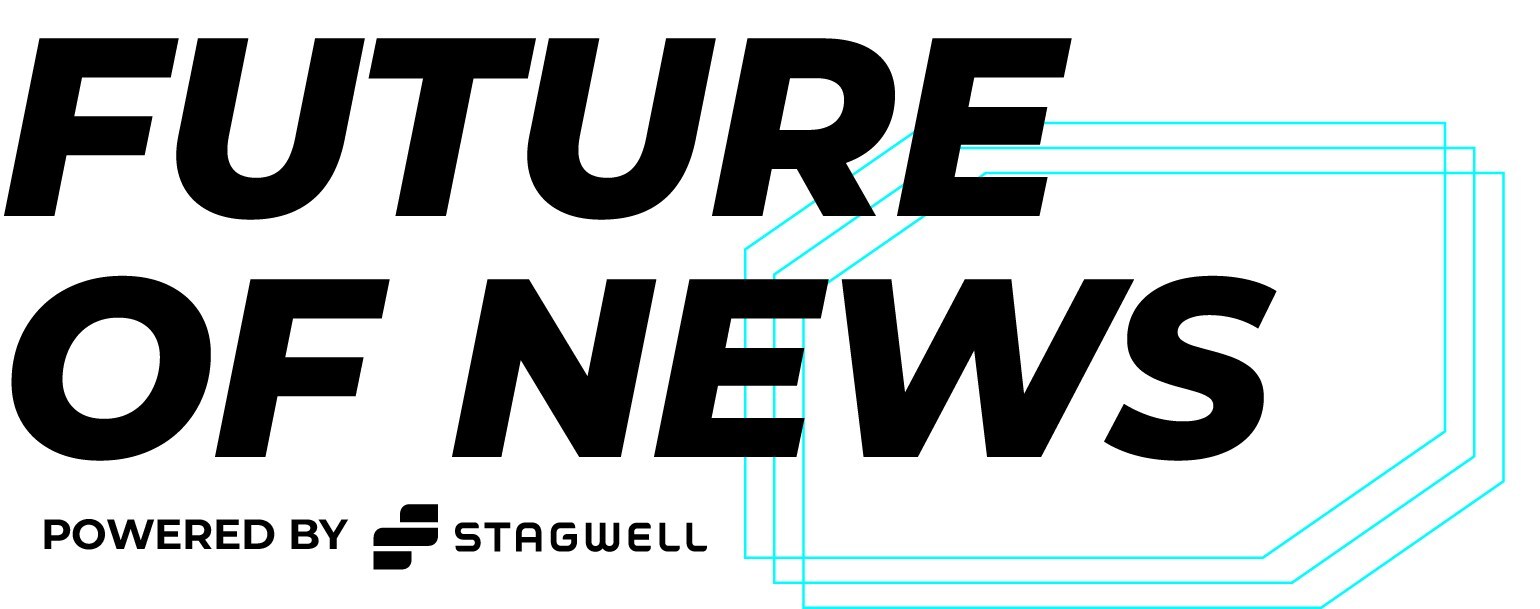
By: Ray Day
CONTACT:
We wanted to share our latest consumer and business insights, based on research from Stagwell. Among the highlights of our weekly consumer sentiment tracking:
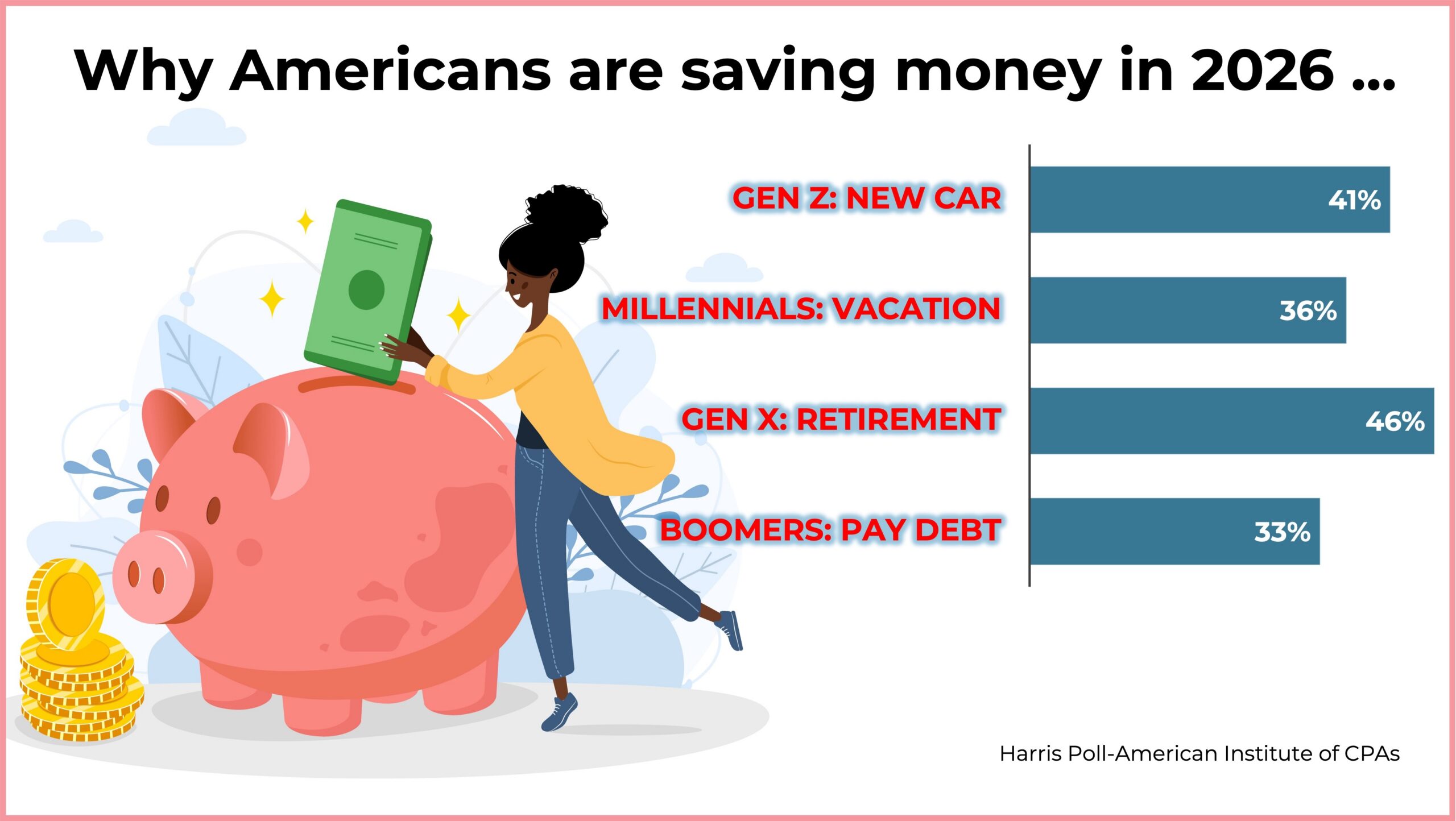
GEN Z SAVING FOR A CAR, MILLENIALS FOR A VACATION
Saving money in 2026 differs widely depending on age group, based on our Harris Poll research with the American Institute of CPAs.
- 92% of Americans say they have financial goals for 2026.
- Gen Z is saving for a car (41%), a home (36%) or investing (39%).
- Millennials are saving for a vacation (36%), paying down debt (35%) or investing (35%).
- 46% of Gen X is saving for retirement.
- 33% of Boomers are paying down debt or investing.
- 52% of Millennials and 50% of Gen Z feel that 2026 will be financially better for them than 2025, compared to 42% of Gen X and only 29% of Boomers.
- Rising cost of living is stopping all generations from hitting their financial goals, including 59% of Boomers, 53% of Gen X, 44% of Millennials and 40% of Gen Z.
OPTING OUT OF THE ECONOMY
41% of Americans are “opting out” of the economy this year, and Gen Z is leading the charge, according to our Harris Poll research.
- 52% of Gen Z say they are finding ways to stop spending, compared with 48% of Millennials, 37% of Gen X and 29% of Boomers.
- 56% of Gen Z women and 49% of Gen Z men have no interest in supporting the economy this year – up 10 and 21 points respectively from last year.
- Reasons for opting out include protecting finances by cutting spending (31%), needing a mental health break from economic and business cultures (29%) and not wanting to support the current administration (28%).
- 41% of Gen Z say they don’t shop at their favorite store anymore because of their politics.
- Americans earning more than $100,000 are following suit: 49% of are shifting spending to align with their morals, and 40% are actively finding ways to disengage from the economy.
DISSING DATING APPS
Modern dating culture is evolving from app-led to more romantic and organic connections, according to Harris Poll’s Modern Dating Survey.
- 56% say app meetups are cringe compared, while 80% who meeting someone in real life is cute or cool.
- 72% say apps make dating feel more transactional than romantic.
- 75% say they want more curated ways to meet people than dating apps offer.
- 57% meet partners through friends, work or organically, compared with 24% who meet online.
- 75% say AI has made dating interactions harder to trust.
- See also: Valentine’s Day not just for romance any more
- See also: Highly attractive partners have ‘financial stability’–but these 4 money red flags doom a relationship
ICYMI: In case you missed it, check out the thought-leadership and happenings around Stagwell making news:
Newsletter
Sign Up
Related
Articles
Weekly Data
Feb 19, 2026
WHAT THE DATA SAY: 79% would be more loyal if employers better supported parents
Childcare has overtaken retirement benefits in the workplace, and most…
In the News, Press Releases
Feb 18, 2026
The Numbers are Clear: Latest Iteration of Stagwell’s News Advertising Study Shows Germans Love Their News

By: Ray Day
CONTACT:
We wanted to share our latest consumer and business insights, based on research from Stagwell. Among the highlights of our weekly consumer sentiment tracking:
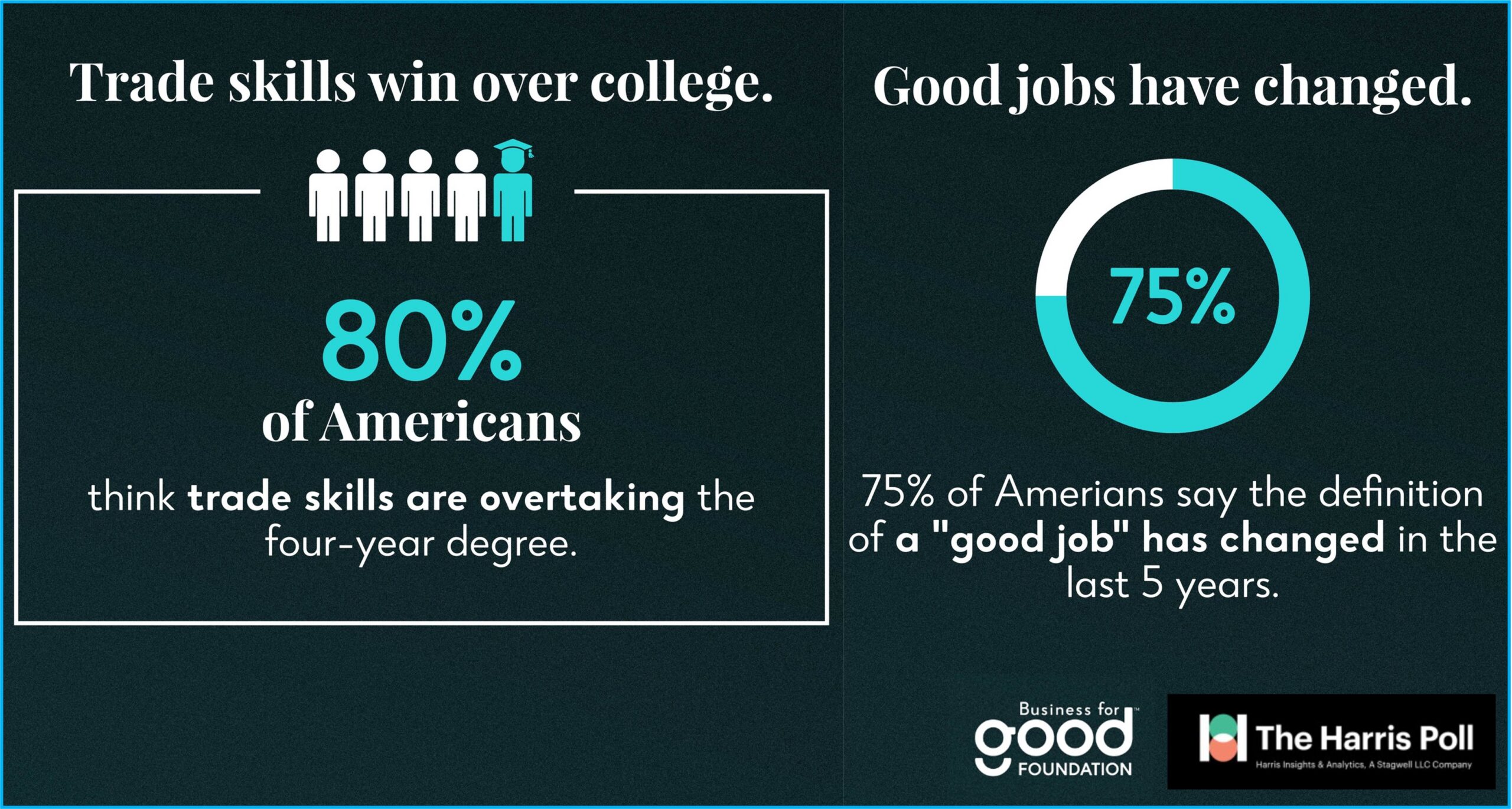
WORRIED ABOUT AI TAKING YOUR JOB? CHANGE YOUR COLLAR COLOR
3 in 4 Americans today believe blue-collar jobs are more likely to be AI-proof, based on our Harris Poll research with the Business for Good Foundation.
- 76% believe jobs relying on hands-on or trade skills are less likely to be replaced by AI than other types of work.
- 80% say more people today are choosing trade skills training and certification programs over a traditional four-year college degree.
- 78% say the stigma around trade and blue-collar work is declining.
- 75% say that what they consider a “good job” today is very different from five years ago.
- See also: Americans are rethinking college in the search for economic mobility
AMERICANS’ MOOD STAYS MIXED
Americans have not changed their view of how the country is trending, yet they are slightly more upbeat about the economy, according to our January Harvard CAPS/Harris Poll.
- 38% say the country is on the right track – compared with 39% in December and 35% in September.
- 38% say the economy is on the right track – up 2 points from December.
- 35% say their financial situation is improving – up 2 points from December.
- Inflation (33%) is the top issue, followed by immigration (29%, up 3 points).
- 55% disapprove of how immigration enforcement agencies like ICE and Border Patrol (CBP) are enforcing laws in U.S. cities.
- 57% say ICE and CBP have gone too far.
- See also: Trump Approval Drops with 57% Saying ICE And CBP Have Gone too Far
DATING DEALBREAKER$
Financial dishonesty is a dating dealbreaker for Americans, according to our Harris Poll survey with NerdWallet.
- 54% say a partner lying about his or her financial situation is a dealbreaker.
- Other dealbreakers: asking to borrow money (46%), expecting you to pay for dates (38%), not investing for the future (31%) and credit card debt (17%).
- 50% of American couples say they’ve lied or withheld financial information from their current partner, and 52% have lied to a previous partner.
- 18% have lied about purchases.
- 16% have lied about lending money to a friend or family member.
- 42% say talking about money early in a relationship is a red flag.
- 78% say it’s a green flag if a partner earns more money than them.
- See also: Only 55% of Gen Z feel like they’re ready for a romantic partnership
ENTERTAINMENT HABITS CHANGING
Viewer habits are changing rapidly and redefining the future of the entertainment industry, according to Stagwell’s National Research Group 2026 In the Frame study.
- 26% of all viewers and 35% of Gen Z found out about the most recent movie they watched from social media.
- Viewers want to see more content on friendship and loyalty (36%) and less about non-monogamy and polyamory (31%).
- Viewers are less interested in engaging with AI-created content: 36% less for movies, 37% less for TV or series and 42% less for podcasts.
- 74% of Millennials, 70% of Gen Z and 70% of Gen X are using streaming platforms over cable to watch live sports.
- Boomers are the only generation watching sports on cable (71%) over streaming (47%).
- 48% of viewers would be interested in watching live sports in a movie theater.
ICYMI: In case you missed it, check out the thought-leadership and happenings around Stagwell making news:
- Allison Worldwide Named Official Public Relations Partner for North American Car, Truck and Utility Vehicle of the Year Awards (NACTOY)
- Ray Day hosts PRSA’s next AI Pulse on “the difference between traditional SEO success and AI credibility”
- The Super Bowl Is the One Night We Still Show Up Together
- We’ll Try Driverless Taxis Before We Trust Them: The Autonomous Acceptance Gap explains why
Newsletter
Sign Up
Related
Articles
Weekly Data
Feb 19, 2026
WHAT THE DATA SAY: 79% would be more loyal if employers better supported parents
Childcare has overtaken retirement benefits in the workplace, and most…
In the News, Press Releases
Feb 18, 2026
The Numbers are Clear: Latest Iteration of Stagwell’s News Advertising Study Shows Germans Love Their News

By: Ray Day
CONTACT:
We wanted to share our latest consumer and business insights, based on research from Stagwell. Among the highlights of our weekly consumer sentiment tracking:
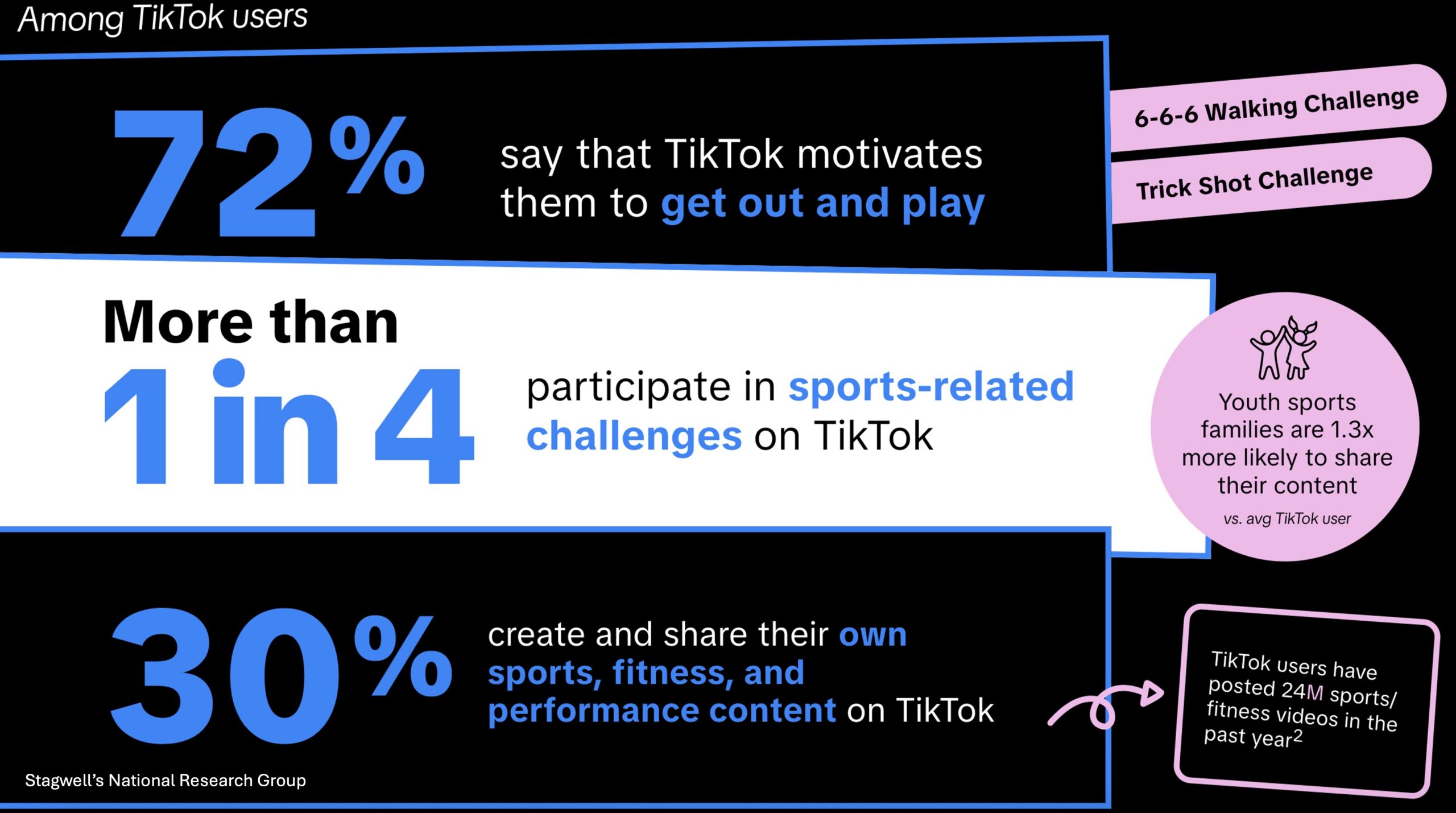
TIKTOK REWRITING SPORTS FANDOM
TikTok and social media allow sports fans to engage in positive new ways, based on new National Research Group research.
- 62% of sports fans enjoy watching sports content on social media more than on traditional TV.
- 72% say TikTok, in particular, motivates them to play.
- 34% say TikTok motivates activity in sports/fitness through giving new ideas for sport activities or workouts to try.
- 35% who purchased a sports-related item seen on TikTok say the item was highlighted in a tutorial or “how-to” video.
- 50% prefer watching short clips, highlights or behind-the-scenes moments over full games (60% for Gen Z).
- Fans follow athletes on social media to see their lives off the field (61%), lifestyle and opinions (56%), and training regimens (52%).
- Fans younger than 45 are twice as likely to say the top season they engage with pro sports is to connect with athletes.
- See also: How can sports win over non-fans?
AI OUT, HUMOR IN AT SUPER BOWL
As Super Bowl approaches, viewers want to see funny ads, not AI-generated content, according to our Harris Poll research in Ad Age.
- While 55% of streaming or cable viewers are interested in AI-generated movies and TV shows, only 17% of Super Bowl viewers want to see AI-generated ads.
- Younger generations are more open: 21% of Gen Z and 28% of Millennials want to see AI-generated ads.
- 44% don’t like the idea of AI being used in ads at all.
- 36% would be more open to AI-generated ads if they disclosed that AI was used.
- 71% of viewers want to see funny ads at this year’s Super Bowl.
- 46% say they are more likely to remember funny ads.
- See also: 2 Million U.S. Employees May Miss Work on Super Bowl Monday
LEADERSHIP DISCONNECT
63% of senior leaders would seek input more often from their teams if it did not make them look weak, according to our Harris Poll research with Turas Leadership.
- Male leaders (71%) are more likely than female leaders (46%) to fear the cost of asking for team input.
- 90% wish their teams would challenge them more.
- At the same time, 63% of Gen Z and 52% of Millennials don’t feel confident expressing their opinions at work.
BENEFITS OF GLP-1
Weight loss drugs are becoming mainstream, and our Harris Poll research outlines the latest user trends and insights.
- Millennials are more likely to have taken or consider a GLP-1 (54%) than Gen X (48%), Gen Z (47%) and Boomers (26%).
- 64% of parents with children under 18 have taken or are considering a GLP-1.
- Top improvements from users include eating less low-quality food (50%), eating more high-quality natural food (44%) and decreasing “food noise” (43%).
- 52% of Millennials would take a GLP-1 if it also would help with an addiction like gambling, gaming or social media use.
- 48% of Americans would try a GLP-1 in pill form.
ICYMI: In case you missed it, check out the thought-leadership and happenings around Stagwell making news:
- How Social Media Screenings Affect Hiring Decisions
- How Gen Z’s Pursuit of Personal Growth Is Redefining Romance
- Study Shows Faith On Screen Can Win Over Audiences — Even The Non-Religious (new HarrisX research)
- ChatGPT is launching paid ads (Assembly insights)
- The future of AI search (Assembly insights)
- SPORT BEACH Clubhouse at Super Bowl LX
Newsletter
Sign Up
Related
Articles
Weekly Data
Feb 19, 2026
WHAT THE DATA SAY: 79% would be more loyal if employers better supported parents
Childcare has overtaken retirement benefits in the workplace, and most…
In the News, Press Releases
Feb 18, 2026
The Numbers are Clear: Latest Iteration of Stagwell’s News Advertising Study Shows Germans Love Their News

By: Ray Day
CONTACT:
We wanted to share our latest consumer and business insights, based on research from Stagwell. Among the highlights of our weekly consumer sentiment tracking:
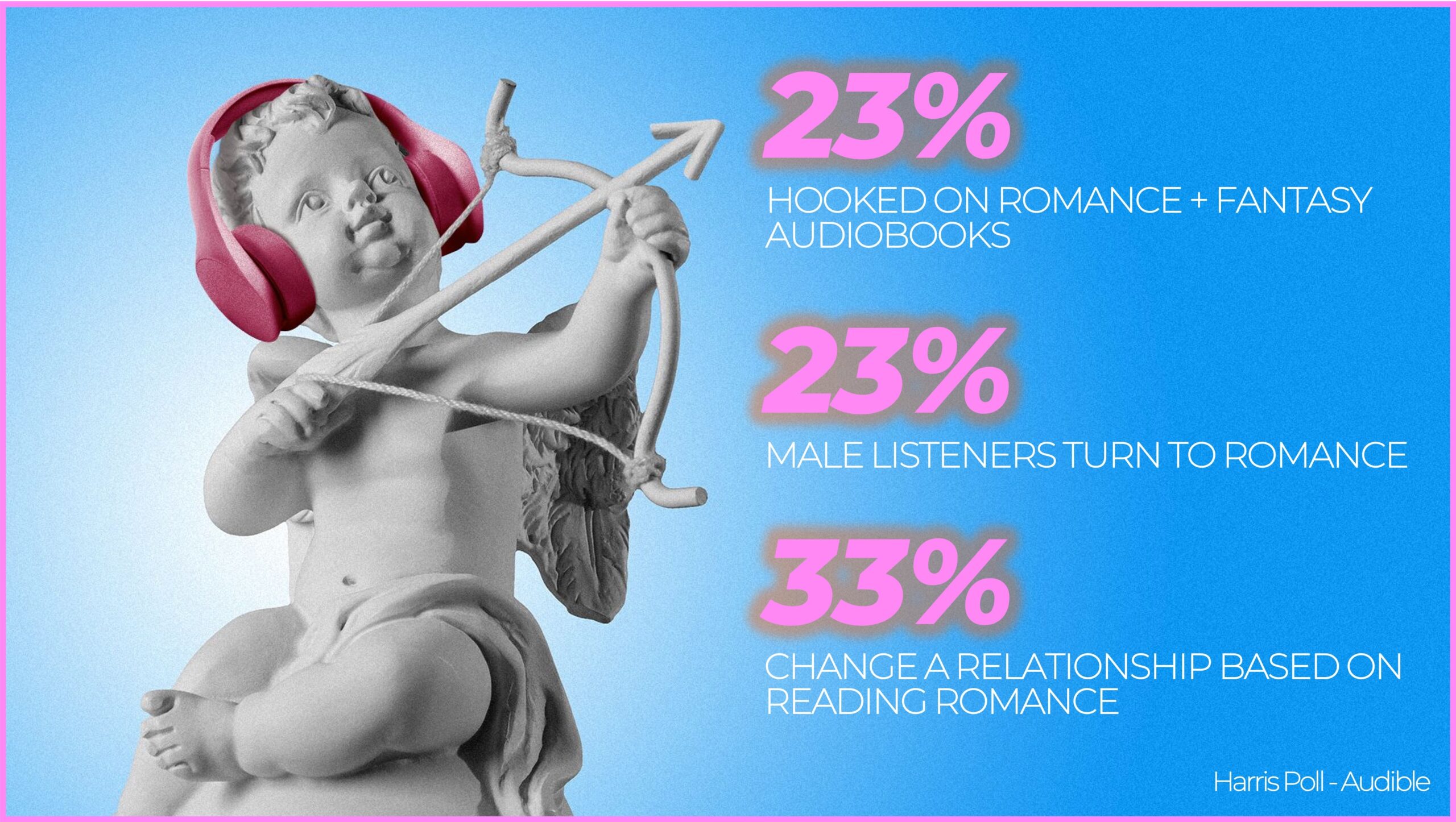
RISE OF ROMANCE
Romance fantasy and related niche genres are attracting new and growing audiences – especially among men – through audiobooks, according to our Harris Poll research with Audible.
- 23% of male listeners now listen to romance.
- 23% of audiobook fans are hooked on sports romance.
- 33% say reading romance made them rethink what they want in their current or future relationships.
SHORTER, SHARED SPORTS GAMES, PLEASE
Sports fans today want sports that are shorter and shared, based on Harris Poll’s The Joy Rematch research.
- A gap exists between the experience fans have today and what they want: 93% say they receive joy from sports – yet the remaining 7% represents a massive opportunity.
- Willingness to watch two-plus-hour sports events drops from 43% on weekends to 26% on weeknights.
- High appeal exists for instant rules (78%), tactics overlays (74%), ref/coach mic-ups (72%) and body cameras (67%).
- 57% prefer to watch “big sports moments” together with friends or family.
- The biggest barriers to attending live events are ticket prices (71%), parking and transit costs (44%), and accessibility to the venue (37%).
AI FEARS HIGHEST FOR THOSE MAKING LESS THAN $50,000
Workers making less than $50,000 annually are the most worried that AI will undermine their job security, according to our HarrisX research with Merit America.
- While many making $50,000 and less believe AI could be helpful, 53% think it will make economic mobility harder.
- 56% think they will need to change careers because of AI.
- 70% would stop the development of AI technology that could eliminate a lot of jobs.
- 86% would participate in free training and 76% would feel more confident and prepared for AI if they received more training.
- 56% believe the government is not prepared to handle AI.
- Two thirds say higher education does not offer a good return on investment, with majorities pointing to tuition (50%) and personal debt (52%) as barriers.
- 63% say higher education leaves people less prepared to achieve the American Dream.
CONFIDENCE IN COMPANIES
Companies are not meeting the general publics’ standards for economic impact, according to the 2026 Page-Harris Poll Confidence in Business Index.
- 61% globally say it’s very important for leading companies to make a positive impact on economic stability and growth.
- Only 29% of the public say they see companies acting on key issues and clearly explaining what they are doing and why.
- Economic stability tops citizens’ global concerns, yet only 29% say they see companies acting.
- Gen Z adults places more weight on issues such as mental health, gender equality and racial/minority equality, and look for companies to signal values clearly.
- Older generations, especially Boomers, focus more on economic stability, corruption and jobs.
ICYMI: In case you missed it, check out the thought-leadership and happenings around Stagwell making news:
Newsletter
Sign Up
Related
Articles
Weekly Data
Feb 19, 2026
WHAT THE DATA SAY: 79% would be more loyal if employers better supported parents
Childcare has overtaken retirement benefits in the workplace, and most…
In the News, Press Releases
Feb 18, 2026
The Numbers are Clear: Latest Iteration of Stagwell’s News Advertising Study Shows Germans Love Their News

By: Ray Day
CONTACT:
We wanted to share our latest consumer and business insights, based on research from Stagwell. Among the highlights of our weekly consumer sentiment tracking:
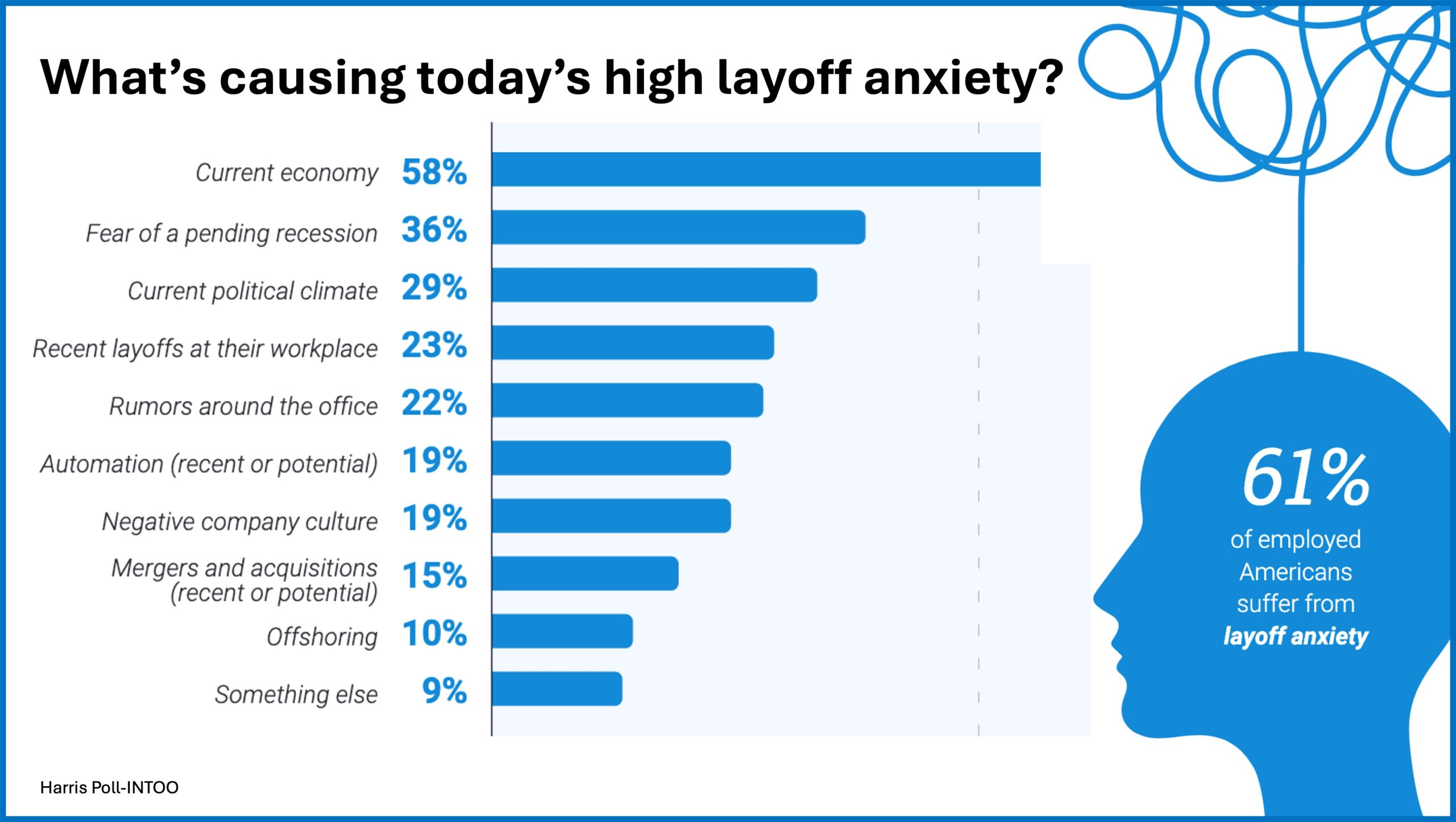
WORRIED ABOUT LAYOFFS
3 in 5 employed Americans are concerned about being laid off – a nearly 30% increase since 2019, according to our Harris Poll research with INTOO.
- 61% of employees are concerned about job loss, up from 48% in 2019.
- Automation fears have doubled since 2019 (12% today compared with 6% in 2019).
- 76% of employees believe most layoffs during the past few years could have been avoided with better business management from leadership.
- 69% of employees agree that “AI layoffs” are just an excuse for cost-cutting.
- 49% trust employees’ social media posts over CEO announcements when it comes to the real story behind layoff news.
- 52% would take a pay cut for guaranteed job protection from layoffs over the next two years.
IS AI STRESSING US OUT?
Users are more optimistic about AI usage and adoption than public discourse suggests, according to our National Research Group research.
- People frequently feel curious (18%), inspired (15%), happy (14%), excited (14%) and empowered while using AI – more so than stressed (6%), intimidated (5%) or confused (5%).
- Students and workers primarily use AI for searches and summaries on a topic (47%) and emails, texts and messages (41%).
- 43% use AI in their personal life to learn something new.
- Workers making less than $100,000 a year are more likely to say AI increases stress at work.
GEN Z = SIDE HUSTLES
Gen Z is opting for side hustles to combat uncertainty about today’s economy and a tough job market, according to our Harris Poll research featured in Axios.
- 57% of Gen Z have a side gig, compared with 21% of older generations.
- Two out of three adults under the age of 34 pursue an entrepreneurial venture.
- Recent graduates are struggling: College students’ optimism has fallen to the lowest level since tracking began in 2018.
- On the bright side, the number of Gen Z entering management is similar to previous generations at their age.
ICYMI: In case you missed it, check out the thought-leadership and happenings around Stagwell making news:
Newsletter
Sign Up
Related
Articles
Weekly Data
Feb 19, 2026
WHAT THE DATA SAY: 79% would be more loyal if employers better supported parents
Childcare has overtaken retirement benefits in the workplace, and most…
In the News, Press Releases
Feb 18, 2026
The Numbers are Clear: Latest Iteration of Stagwell’s News Advertising Study Shows Germans Love Their News

By: Ray Day
CONTACT:
We wanted to share our latest consumer and business insights, based on research from Stagwell. Among the highlights of our weekly consumer sentiment tracking:
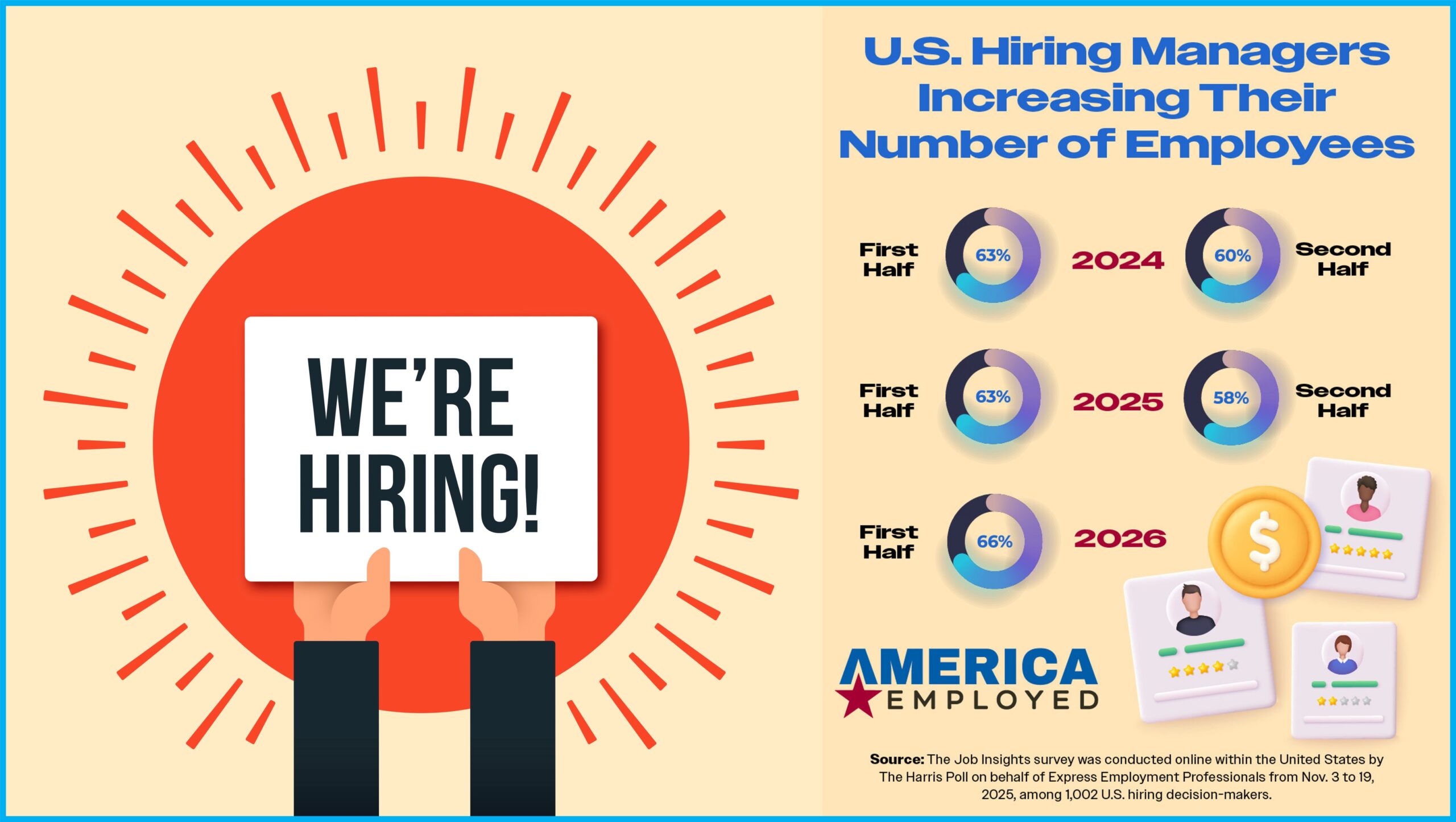
HIRING OUTLOOK IMPROVES
Hiring managers are optimistic entering 2026, yet technology and skill gaps will continue disrupting employment, according to our Harris Poll study with Express Employment Professionals.
- 85% of hiring managers report a positive outlook for the year ahead.
- 2 out of 3 plan to increase headcount in the first half of 2026, focused on market expansion (38%) and seeking new skill sets (38%).
- 83% are willing to use contingent workers to meet business needs.
- 36% have open positions they can’t fill.
- Fewer companies are planning to hire students (33%) and retirees (10%).
- Increased use of technology (39%) and not replacing employees who leave (33%) are the top reasons for reducing staff.
- 91% of hiring managers expect employment obstacles in 2026, including AI related complexities (46%), finding qualified candidates (40%) and increased competition for talent (28%).
- See also: Gen Z is sick of working from home
AI APPROVAL GAP
The general public is more weary of AI use than corporate America, according to our Harris Poll report with JUST Capital.
- 80% of investors and 93% of executives see positive effects of AI use, yet only 58% of the general public agrees.
- 81% say business leaders have a responsibility to address the ethical use of AI.
- All parties agree AI-generated content needs to be watermarked: 86% of executives, 84% of investors and 78% of the general public.
- 90% say it is critical that companies ensure AI training and development are available to employees.
AI AS THE MARKETING CONNECTIVE TISSUE
B2B marketers are embracing AI to focus on customer experience and brand building, according to our Harris Poll survey with Madison Logic.
- 55% expect AI to reshape how strategies are developed and executed.
- 45% believe AI-powered search and assistants will dramatically change how customers discover brands.
- 33% say customer experience will be the key differentiator for growth.
- See also: 2026 will be the year marketers rediscover the basics
FINANCIAL SECURITY DOWN
Women and lower earners are feeling worse about the state of the economy, according to our Harris Poll survey with The Guardian.
- 45% of Americans say their financial security is worse (20% say better).
- 57% say the U.S. economy is in a recession – up 11% since last February.
- Women are less confident than men: 62% believe the U.S. is experiencing a recession, and 50% believe their financial security is worse (versus 52% of men who see a recession and 39% of men who say their financial security is worse).
- 59% of those making less than $50,000 a year say their financial situation is becoming worse, compared with 37% of those making more than $100,000.
- See also: Men More Financially Confident in the New Year
ICYMI: In case you missed it, check out the thought-leadership and happenings around Stagwell making news:
Newsletter
Sign Up
Related
Articles
Weekly Data
Feb 19, 2026
WHAT THE DATA SAY: 79% would be more loyal if employers better supported parents
Childcare has overtaken retirement benefits in the workplace, and most…
In the News, Press Releases
Feb 18, 2026
The Numbers are Clear: Latest Iteration of Stagwell’s News Advertising Study Shows Germans Love Their News

By: Ray Day
CONTACT:
We wanted to share our latest consumer and business insights, based on research from Stagwell. Among the highlights of our weekly consumer sentiment tracking:

MORE TRAVEL IN 2026
Half of Americans will spend more on travel in 2026 and less on material goods, according to our Harris Poll survey with Marriott Bonvoy.
- 91% of Americans plan to travel in 2026.
- 49% say they want to travel more than they did in 2025.
- 67% plan to prioritize experiences, such as travel, over material goods.
- 57% say carving out time to rest and recharge is the most meaningful benefit of travel.
- 70% of Millennials would rather give up dining out for six months than give up a vacation.
- See also: Big ideas that will define 2026
GEN Z LEADS WITH AI
Gen Z’s rapid adoption of AI is already enhancing their leadership and management skills, according to our Harris Poll research with Google Workspace.
- 82% of young leaders say they use AI tools at work.
- 93% of Gen Z use two or more AI tools a week, compared with 79% of Millennials.
- 75% actively recommend tools to colleagues.
- 70% use AI to draft emails, handle difficult messages or overcome language barriers.
- 50% say automating routine work frees them for strategic priorities.
- 47% see it enhancing team-wide communication and problem-solving.
- 86% feel AI can help current executives become better leaders.
- 98% expect AI to affect their industry or workplace within the next five years.
- See also: Gen Z is defiantly ‘giving up’ on ever owning a home
SEASON OF GIVING
Americans have donated more to charities this year than last, according to our Harris Poll research with Vanguard Charitable.
- 75% of Americans gave to charities this past year.
- Average giving reached $1,394 this year – a 29% increase from 2024.
- Donors who plan gifts with a budget are more likely (43%) to increase their donations than those without a budget (17%).
ICYMI: In case you missed it, check out the thought-leadership and happenings around Stagwell making news:
Newsletter
Sign Up
Related
Articles
Weekly Data
Feb 19, 2026
WHAT THE DATA SAY: 79% would be more loyal if employers better supported parents
Childcare has overtaken retirement benefits in the workplace, and most…
In the News, Press Releases
Feb 18, 2026
The Numbers are Clear: Latest Iteration of Stagwell’s News Advertising Study Shows Germans Love Their News

By: Ray Day
CONTACT:
We wanted to share our latest consumer and business insights, based on research from Stagwell. Among the highlights of our weekly consumer sentiment tracking:
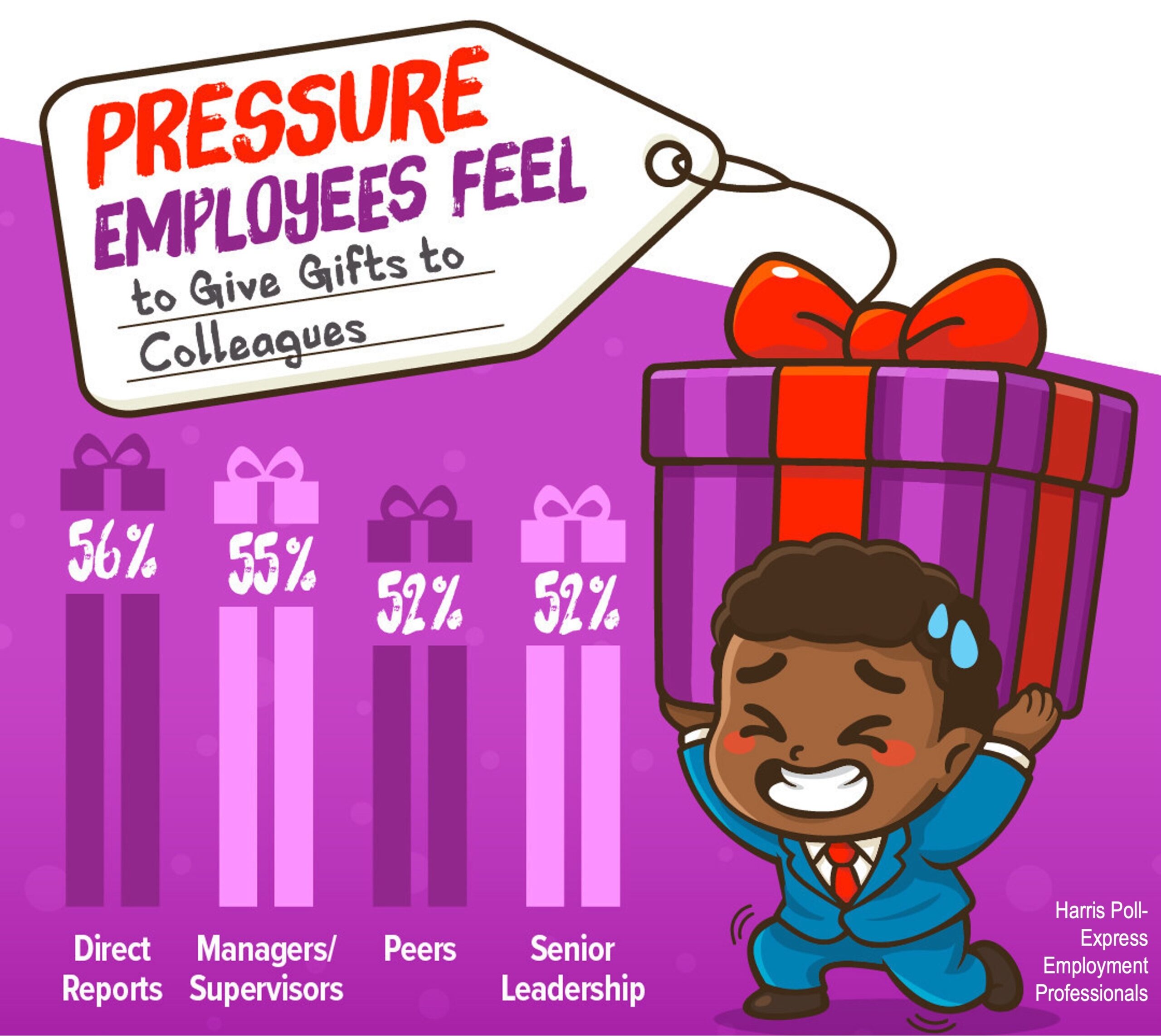
AMERICANS’ MOOD IMPROVES
Americans are more optimistic about the country and economy than previous months, yet inflation remains a top issue, according to our December Harvard CAPS/Harris Poll.
- 39% say the country is on the right track – up 4 points from November.
- 36% say the economy is on the right track – up 3 points from November.
- 1 in 3 say their financial situation is improving – up slightly.
- Inflation (36%) and the economy and jobs (29%) remain the top issues.
- 46% say they were personally affected by the government shutdown.
- 48% say 2020 – before the pandemic – was the last time the economy was “good.”
- See also: 57% say Trump is losing battle against inflation
GIFT-GIVING STRESS
The holiday season means more stress for employees who feel pressure to give gifts, based on our Harris Poll survey with Express Employment Professionals.
- 94% of U.S. hiring managers say their company hosts celebrations, most commonly for holidays (61%), birthdays (51%) and work anniversaries (50%).
- 64% say employees regularly exchange gifts.
- While 87% of employees say their company hosts celebrations where gift exchanges are common, half feel pressured to give gifts to coworkers.
- 46% feel pressured to spend a specific amount on gifts.
- Gen Z and Millennials are significantly more likely than Gen X to feel this pressure, such as giving gifts to managers (33% of Gen Z and 29% of Millennials say it’s a stressor versus 10% of Gen X).
- 62% say gift-giving fosters a sense of obligation that can negatively affect team dynamics.
CEOS BULLISH ON AI
Business leaders admit that AI will affect some jobs, yet say the overall effect of this technology will be positive to society, according to new National Research Group research presented at the Wall Street Journal’s 2025 CEO Council Summit.
- 68% of CEOs say AI will weaken the U.S. job market, yet agree it will strengthen productivity and output, the U.S. and global economies and U.S. global competitiveness.
- 78% are bullish on AI’s impact on workplace efficiency and innovation.
- 85% see AI as entering a healthy growth phase rather than a bubble.
- Looking at 2026, CEOs are most concerned about inflation (77.5% say it’s a negative), tariffs (70.6% negative) and U.S.-China relations (68.6% negative).
RETIREMENT WORRYING GEN X
Late preparation has left Gen X uncertain of retirement realities, according to our Harris Poll report with Nationwide.
- 61% of Gen Xers didn’t view retirement as a priority until age 50 or later (26% say age 60 or later).
- 89% believe cost of living is making it harder to retire comfortably.
- To prepare, Gen X has cut discretionary spending (40%), increased contributions to retirement accounts (34%), sought out professional financial advice (23%) and shifted their investment strategy to reduce risk (19%).
- Despite these measures, 25% are concerned their savings won’t last more than 14 years.
- 16% are planning to retire later than initially hoped.
- 15% don’t know if they’ll ever be able to retire.
- 39% of financial advisors say insufficient retirement income is one of the biggest obstacles for Gen X retirement readiness.
ENTREPRENEURIAL BACK-UP PLAN
83% of Americans view owning a business as a viable alternative to traditional jobs, according to our Harris Poll research with Entrepreneur’s Source.
- 70% of Americans believe business ownership offers greater opportunities than traditional jobs in today’s economy.
- 61% say business ownership is the key to thriving in an AI-driven world.
- 69% say business ownership is the best protection against ageism (highest amongst Millennials at 76%).
- 83% of parents say funding a child’s business is a good investment in their long-term financial security.
- 64% even consider financially supporting their child’s business a smarter investment than paying college tuition.
ICYMI: In case you missed it, check out the thought-leadership and happenings around Stagwell making news:
- Everyone needs to listen to why this Chief Communications Officer got fired
- As AI’s novelty wears off, workers want it to be better
- Tech companies, not the government, are positioned to act on mental health
- The Preventive Care Tradeoff: How Rising Costs Are Reshaping Family Finances
- Six-figure earners are ‘living the illusion of affluence’ while working side hustles, skipping meals, and pretending Venmo’s not working
- Allison Worldwide hires Jeremy Lucas as first Europe CEO
Newsletter
Sign Up
Related
Articles
Weekly Data
Feb 19, 2026
WHAT THE DATA SAY: 79% would be more loyal if employers better supported parents
Childcare has overtaken retirement benefits in the workplace, and most…
In the News, Press Releases
Feb 18, 2026
The Numbers are Clear: Latest Iteration of Stagwell’s News Advertising Study Shows Germans Love Their News

By: Ray Day
CONTACT:
We wanted to share our latest consumer and business insights, based on research from Stagwell. Among the highlights of our weekly consumer sentiment tracking:
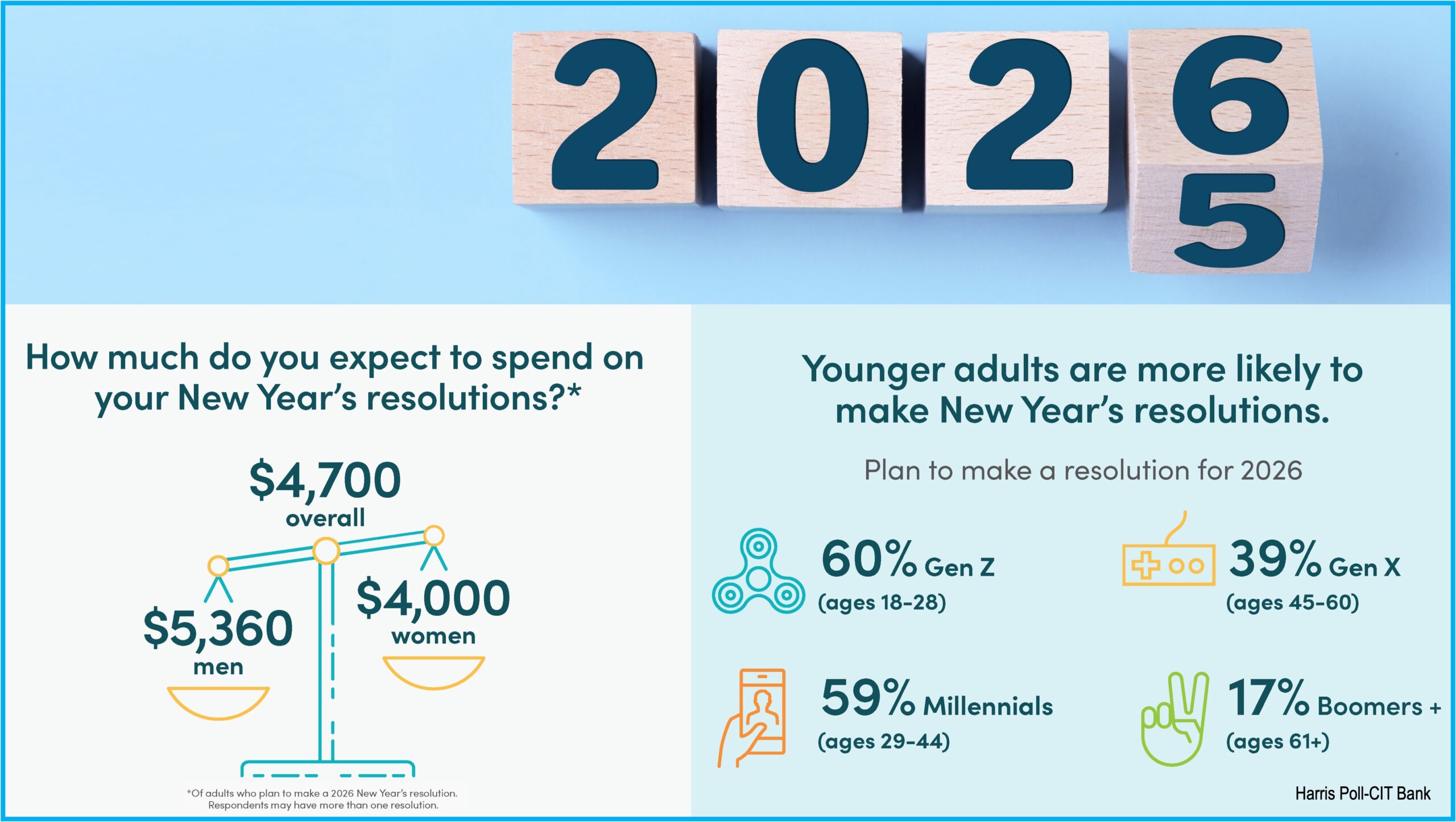
NEW YEAR’S RESOLUTIONS COST $4,700
Americans will spend an average of $4,700 to achieve their 2026 resolutions, according to our Harris Poll report with CIT Bank.
- 42% of Americans are making 2026 New Year’s resolutions.
- 55% of those making resolutions are committed to financial resolutions like budgeting, saving, investing, paying off debt or building credit.
- Men are expected to spend more to achieve their resolutions than women ($5,360 compared with $4,000).
- Women (65%) are more likely to reduce spending to reach their goals than men (55%).
- The top goals: saving for are travel (40%), purchasing a car (25%) and buying a house (21%).
- See also: The Holiday Budget Break: How Brands Can Help Consumers Avoid Debt
MIXED FEELINGS FOR 2026
While more than half of Americans predict higher prices going into 2026, more than a third feel financially confident going into the new year, according to our Harris Poll survey with NerdWallet.
- 63% of Americans say 2026 will be financially better for them than 2025.
- 35% feel optimistic or confident about their finances going into 2026, 32% feel anxious, and 30% feel stressed.
- Gen Z and Millennials (33%) are more likely to feel excited about their finances going into the new year than Gen X (20%) and Boomers (7%).
- 51% think consumers prices for goods and services will get worse in 2026.
- 33% are not confident in their ability to withstand a 2026 recession if it occurred.
- 57% plan to take at least one risky financial action in 2026, like investing in crypto (20%) or AI-related stocks or funds (18%).
- 30% plan to pay off their debts in full.
GEN Z SAY WORK TRIPS = VACATIONS
Gen Z business travelers are more likely than other generations to extend a work trip for pleasure, according to our Harris Poll research in Business Insider.
- Nearly two thirds of Gen Z workers bundle business and personal travel.
- 9 in 10 Gen Z members see work trips as a chance to upgrade their lifestyles (7 in 10 Millennials).
- Younger professionals are more than twice as likely to pay out of pocket to upgrade a flight.
- Two thirds have paid to switch to a nicer hotel – compared with half of those from older generations.
- Gen Z and Millennials post three to five times more per day on social media than their colleagues while on work trips.
- 75% splurge on high-end dinners and entertainment.
COST ISSUES MEAN DEFERRED HEALTH CARE
41% of insured Americans have skipped healthcare appointments due to rising costs, according to our Harris Poll report with the Nationwide Retirement Institute.
- 37% of U.S. insured adults avoid medical care when sick due to cost concerns.
- Americans have cancelled dental cleanings (23%), vision tests (20%) and mental health care (16%).
- 18% have turned to medical debt or credit cards to cover out-of-pocket expenses.
- 73% cite health care expenses going out of control as a top retirement fear.
- 59% say they are not confident in their ability to budget for health care expenses in retirement.
AGE OF DISSONANCE
The Harris Poll’s The Age of Dissonance Report explores how tensions of AI, culture and success are shaping consumer behavior.
- AI is widely adopted among young professional but also a major source of distress: 65% of Gen Z report a fear of being obsolete, and 45% say AI has made their college education irrelevant.
- The desire to be efficient and adhere to digital algorithms has resulted in a sea of sameness across brands: 79% say high-end experiences have lost their soul due to the copy-and-paste treatment.
- Inflation, inequality and institutional distrust have disrupted the traditional paths to success: 64% say the only realistic way to build wealth today is through alternative methods like crypto, meme stocks or gambling.
ICYMI: In case you missed it, check out the thought-leadership and happenings around Stagwell making news:
Newsletter
Sign Up
Related
Articles
Weekly Data
Feb 19, 2026
WHAT THE DATA SAY: 79% would be more loyal if employers better supported parents
Childcare has overtaken retirement benefits in the workplace, and most…
In the News, Press Releases
Feb 18, 2026
The Numbers are Clear: Latest Iteration of Stagwell’s News Advertising Study Shows Germans Love Their News

